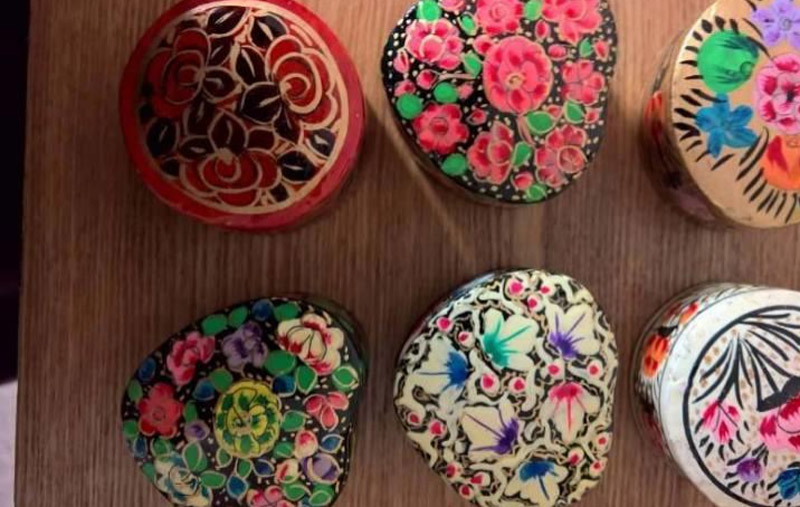 Christmas Bells
Christmas Bells Srinagar: The Christmas festival has brought cheer to the papier-mâché artisans of Kashmir who have received bulk orders from across the country as well as the European markets.
“We have received bulk orders for making balls, stars, Santa Claus and other decorative items from the exporters on this festival,” a group of papier-mâché artisans at Alamgari Bazar in Downtown, Srinagar, told Greater Kashmir.
“We are trying our best to meet all the orders within time,” they said.
According to the artisans and Kashmir based exporters, the Christmas markets are “fast-passes to a winter wonderland” in cities, villages and towns across the world, combining amazing shopping opportunities with the several combinations to shop.
“Christmas has proved to be a boon for many papier-mâché families in Kashmir as we all are doing brisk business,” Asif Ahmad Joo, a papier-mâché artisan, said.
“Although, we could have done more business as far as these orders were concerned. However, we don’t get many artisans to take up the bulk orders during the festival of Christmas,” Joo said.
He claimed that so far around 10 lakh paper mache products, including papier-mâché balls, snow-flakes or Santa Claus,) must have been dispatched to the several markets in India and abroad.
“Few of us hire artisans who have left this art and they finish the orders during their extra hours and make their livelihood,” he added.
It may be recalled that the art of papier-mâché has flourished in Kashmir in the past.
The art originated in Persia and was brought to Kashmir in the 15th century by a Kashmiri prince who spent some years in a prison in Samarkand in Central Asia, and was favoured by the Mughal rulers.
“We keep receiving the orders for the Christmas throughout the year and in the last few last few months, there is usually surge in the papier-mâché exports in Kashmir in wake of the demand from different parts of the world,” said Ghulam Hassan, a master artisan from Downtown, Srinagar.
A customer, Ummer Maqbool, said that the papier-mâché artisans in Kashmir transform a variety of utility articles into exquisite pieces of rare beauty.
“During festivals and especially during Christmas, we have to make extra decorative items and we are very busy. All the artisans are engaged in this work,” said Rafiq Ahmad Joo, a master artisan of Zadibal area of Downtown, Srinagar.
“Unfortunately there are very few families left, who are into the art and craft of papier-mâché making. We have received bulk orders for making decorative items from Germany, European countries and from different parts of India,” Joo said. Exporter, Nasir Ahmad Mir, said the decorative items including stars, moon, Santa Claus are being exported to many cities including Mumbai, Bangalore, Chennai, Delhi in the country, besides to south and European countries. Pertinently, the traditional method of making these articles in Kashmir begins with soaking waste paper in water for several days till it disintegrates.
Then after draining the excess water from the paper, cloth, rice, straw and copper sulphate are mixed to form a pulp, which is placed in moulds and left to dry for two to three days.
After cutting out the dried shape from the mould, it is then stuck again with glue and gypsum and is rubbed smooth with stone and covered with layers of tissue paper.
“After all this process a base colour is painted and designs made on it. It is again sand papered and finally, painted with different paints,” said Ghulam Hassan, an artisan.
Director Handicrafts, Kashmir, Masrat-Ul- Islam, who keeps educating people about several forms of arts and crafts in Kashmir, said: “Art speaks where words are unable to explain.”
“Conceived 700 years ago, Sakhtasazi is a type of papier-mâché that involves moulding raw paper pulp into aesthetically pleasing objects. This art form involves a unique style of beating objects into dough & shapes which are unbelievably real.”
“We have some gems in papier-mâché art and we all need to project and promote them at all levels.”
Notably, under the World Bank funded scheme, the Jhelum and Tawi Flood Recovery Project (JTFRP) is endeavouring to connect paper-mache artisans with the vibrant market.
According to officials at JTFRP, the allotted cost of the livelihood project is Rs 2.18 crore which would focus on the skill enhancement of the new comers (aspiring artisans) and the advanced training of the master trainers of the papier-mâché art.
“We are aiming to establish sustainable artisan-owned institutions,” Chief Executive Officer, Economic Reconstruction Agency (JTFRP), Dr Syed Abid Rasheed Shah said.
Support Our Journalism
We cannot do without you.. your contribution supports unbiased journalism
IBNS is not driven by any ism- not wokeism, not racism, not skewed secularism, not hyper right-wing or left liberal ideals, nor by any hardline religious beliefs or hyper nationalism. We want to serve you good old objective news, as they are. We do not judge or preach. We let people decide for themselves. We only try to present factual and well-sourced news.







